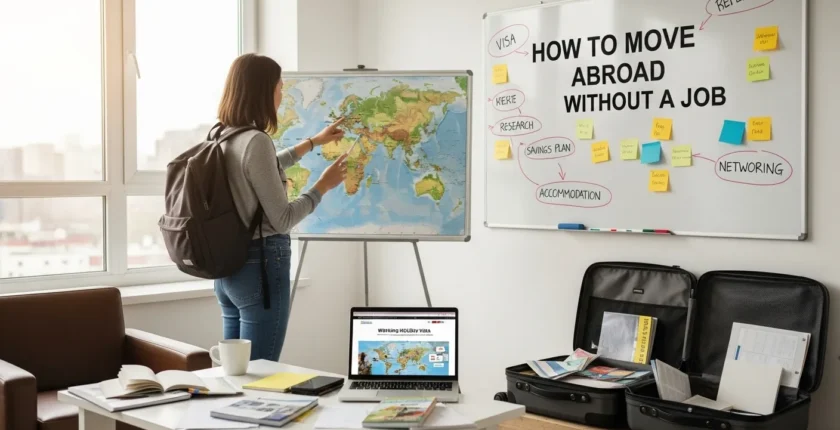
- 1. How to Move Abroad: Making the Dream a Reality
- 1.1. Is Moving Abroad Without a Job Right for You?
- 1.2. Financial Planning: The Cornerstone of Your Move
- 1.2.1. Calculating Your Expenses
- 1.2.2. Building Your Savings
- 1.2.3. Creating a Budget
- 1.3. Visa Options: Navigating the Legal Landscape
- 1.3.1. Tourist Visas
- 1.3.2. Working Holiday Visas
- 1.3.3. Student Visas
- 1.3.4. Investment Visas
- 1.3.5. Digital Nomad Visas
- 1.3.6. Family Visas
- 1.3.7. Visa Research Tools
- 1.4. Finding Accommodation: A Place to Call Home
- 1.4.1. Short-Term Accommodation
- 1.4.2. Long-Term Rentals
- 1.4.3. Shared Accommodation
- 1.5. Building a Network: Connecting with Others
- 1.5.1. Online Communities
- 1.5.2. Meetup Groups
- 1.5.3. Language Exchange Programs
- 1.5.4. Professional Organizations
- 1.6. Finding Work: Generating Income
- 1.6.1. Online Job Boards
- 1.6.2. Freelancing and Remote Work
- 1.6.3. Teaching English
- 1.6.4. Local Businesses
- 1.6.5. Starting Your Own Business
- 1.7. Cultural Adaptation: Embracing the New
- 1.7.1. Learn the Language
- 1.7.2. Respect Local Customs
- 1.7.3. Be Open-Minded
- 1.7.4. Patience is Key
- 1.8. Staying Connected: Maintaining Relationships
- 1.8.1. Schedule Regular Calls
- 1.8.2. Share Your Experiences
- 1.8.3. Plan Visits
- 1.9. Common Pitfalls to Avoid
- 1.10. Checklist for Moving Abroad Without a Job
How to Move Abroad: Making the Dream a Reality
Moving abroad is a dream for many, promising adventure, new experiences, and a fresh start. The traditional approach often involves securing a job before relocating, but what if you want to take the leap without a guaranteed income? While it requires meticulous planning and a healthy dose of courage, moving abroad without a job is entirely achievable. This guide will provide you with a roadmap to navigate the challenges and make your international move a success.
Is Moving Abroad Without a Job Right for You?
Before diving into the practicalities, it’s crucial to honestly assess whether this path is suitable for your circumstances. Consider these factors:
- Financial Stability: Can you comfortably support yourself for an extended period (ideally 6-12 months) without income?
- Risk Tolerance: Are you comfortable with uncertainty and potential setbacks?
- Adaptability: How well do you adjust to new environments and cultures?
- Motivation: Are you highly motivated and resourceful enough to find work or generate income in a new country?
If you answered positively to most of these questions, moving abroad without a job might be a viable option.
Financial Planning: The Cornerstone of Your Move
Financial preparation is paramount. Without a job, you’ll need a substantial safety net to cover living expenses while you search for work or establish alternative income streams.
Calculating Your Expenses
Start by meticulously estimating your monthly expenses in your target country. Consider:
- Accommodation: Rent, utilities, and initial deposits.
- Food: Groceries and dining out.
- Transportation: Public transport, vehicle costs, or cycling equipment.
- Healthcare: Insurance and potential medical expenses.
- Visas and Permits: Application fees and renewal costs.
- Communication: Phone and internet.
- Entertainment: Leisure activities and socializing.
- Miscellaneous: Unexpected expenses and personal items.
Research the cost of living in your chosen city or region. Numbeo and Expatistan are valuable resources for comparing living costs across different locations.
Building Your Savings
Aim to save at least 6-12 months’ worth of living expenses. This provides a buffer while you search for work or develop alternative income sources. Consider these saving strategies:
- Cut unnecessary expenses: Track your spending and identify areas where you can reduce costs.
- Sell unwanted items: Declutter your home and sell items you no longer need.
- Increase your income: Take on freelance work, a part-time job, or sell your skills online.
- Automate your savings: Set up automatic transfers to a dedicated savings account.
Creating a Budget
Develop a detailed budget that outlines your income (if any), expenses, and savings goals. Regularly review and adjust your budget as needed. Use budgeting apps or spreadsheets to track your progress.
Visa Options: Navigating the Legal Landscape
Securing the appropriate visa is crucial for legal residency. Research visa options well in advance of your move.
Tourist Visas
Tourist visas typically allow you to stay in a country for a limited period (e.g., 90 days). While they aren’t suitable for long-term residency, they can be useful for initial exploration and job searching. Be aware of the restrictions on working while on a tourist visa.
Working Holiday Visas
Working holiday visas are available to young adults from certain countries, allowing them to work and travel in a host country for a specified period (usually 1-2 years). These visas often have age restrictions and may require you to be enrolled in full-time education or have recently graduated.
Student Visas
Enrolling in a course of study can allow you to obtain a student visa. Some student visas permit part-time work.
Investment Visas
Some countries offer visas to individuals who invest a significant amount of money in the local economy.
Digital Nomad Visas
Increasingly, countries are offering visas specifically for digital nomads, allowing individuals who earn income remotely to reside legally within their borders. These visas often have specific income requirements.
Family Visas
If you have family members who are citizens or permanent residents of your target country, you may be eligible for a family visa.
Visa Research Tools
Use official government websites and immigration resources to determine the visa options available to you based on your nationality, age, and qualifications. Websites like VisaHQ can help you determine what visas you might be eligible for.
Finding Accommodation: A Place to Call Home
Securing accommodation before you arrive can provide peace of mind. However, it’s often easier to find a place once you’re in the country.
Short-Term Accommodation
Consider booking short-term accommodation (e.g., Airbnb, hostels, or hotels) for your initial arrival. This will give you time to explore different neighborhoods and find a suitable long-term rental.
Long-Term Rentals
Use online platforms such as Craigslist, local Facebook groups, and real estate websites to search for long-term rentals. Be prepared to provide references, proof of income (if available), and a security deposit.
Shared Accommodation
Sharing accommodation with other expats or locals can be a cost-effective option. Websites like Roommates.com and EasyRoommate can help you find potential roommates.
Building a Network: Connecting with Others
Networking is essential for finding job opportunities and building a social life in a new country.
Online Communities
Join online communities and forums for expats in your target country. These groups can provide valuable information, advice, and connections.
Meetup Groups
Attend Meetup events related to your interests and profession. This is a great way to meet like-minded people and expand your network.
Language Exchange Programs
Participate in language exchange programs to improve your language skills and connect with locals.
Professional Organizations
Join professional organizations related to your field. Attend industry events and conferences to network with potential employers.
Finding Work: Generating Income
While you’re moving without a guaranteed job, having a plan to generate income is crucial.
Online Job Boards
Use online job boards such as Indeed, LinkedIn, and Glassdoor to search for job openings in your target country. Tailor your resume and cover letter to the local job market.
Freelancing and Remote Work
Explore freelance and remote work opportunities online. Platforms like Upwork, Fiverr, and Guru connect freelancers with clients worldwide.
Teaching English
If you’re a native English speaker, consider teaching English as a foreign language. Many countries have a high demand for English teachers.
Local Businesses
Reach out to local businesses and inquire about potential job openings. Even if they don’t have any advertised positions, they may be willing to consider your application.
Starting Your Own Business
If you have an entrepreneurial spirit, consider starting your own business. Research the local market and identify opportunities for a successful venture.
Cultural Adaptation: Embracing the New
Adjusting to a new culture can be challenging but also rewarding.
Learn the Language
Learning the local language is essential for integrating into the community and finding job opportunities. Take language classes, use language learning apps, or practice with native speakers.
Respect Local Customs
Research and respect local customs and traditions. This will help you avoid misunderstandings and build positive relationships with locals.
Be Open-Minded
Be open-minded and willing to try new things. Embrace the differences between your culture and the local culture.
Patience is Key
Be patient with yourself as you adjust to your new life. It takes time to adapt to a new environment.
Staying Connected: Maintaining Relationships
Moving abroad can strain relationships with family and friends back home.
Schedule Regular Calls
Schedule regular video calls with family and friends to stay connected.
Share Your Experiences
Share your experiences and adventures with your loved ones through social media or email.
Plan Visits
Plan visits back home or invite family and friends to visit you in your new country.
Common Pitfalls to Avoid
Moving abroad without a job can be challenging. Here are some common pitfalls to avoid: Underestimating the cost of living: Research the cost of living thoroughly and budget accordingly. Failing to research visa requirements: Understand the visa requirements and apply well in advance of your move. Not learning the local language: Learning the local language is essential for integration and job opportunities. Isolating yourself: Make an effort to connect with other expats and locals. Giving up too easily: Be persistent and don’t give up on your dreams.
Checklist for Moving Abroad Without a Job
Here’s a helpful checklist to guide you through the process:
| Task | Status |
|---|---|
| Define your goals and motivations for moving abroad. | ☐ |
| Research potential destinations and their cost of living. | ☐ |
| Calculate your required savings based on estimated expenses. | ☐ |
| Create a detailed budget and savings plan. | ☐ |
| Research visa options and application requirements. | ☐ |
| Gather necessary documents (passport, birth certificate, etc.). | ☐ |
| Secure short-term accommodation for your initial arrival. | ☐ |
| Start building your network online and offline. | ☐ |
| Update your resume and cover letter for the local job market. | ☐ |
| Explore freelance and remote work opportunities. | ☐ |
| Learn basic phrases in the local language. | ☐ |
| Arrange for international health insurance. | ☐ |
| Notify your bank and other financial institutions of your move. | ☐ |
| Pack your belongings and arrange for shipping or storage. | ☐ |
| Book your flight and accommodation. | ☐ |
| Say goodbye to family and friends. | ☐ |
Moving abroad without a job is a significant undertaking, but with careful planning, diligent execution, and a positive attitude, it can be an incredibly rewarding experience. Remember to prioritize financial stability, visa compliance, and cultural adaptation. Embrace the challenges, celebrate the successes, and enjoy the journey of creating a new life in a foreign land. The world awaits, and with the right preparation, you can confidently embark on your international adventure.





